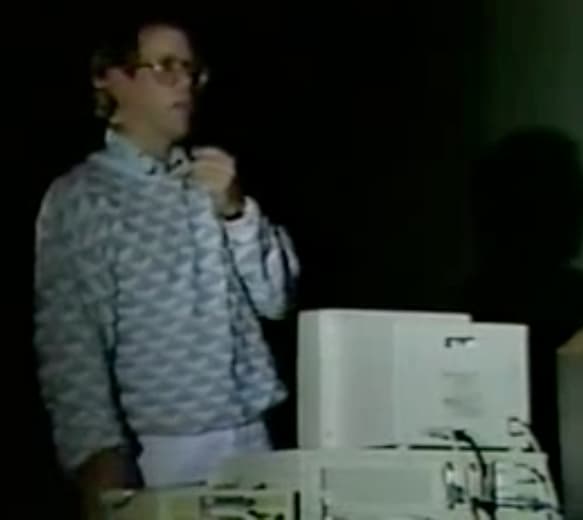HyperCard > Motivation
What was the goal of HyperCard, and what motivation led to it being created?
Today, in the age of the interlinked web, it’s hard to imagine what information siloing was like before. But there were bodies of knowledge not accessible to one another. Bill Atkinson, the creator of HyperCard, started with the motivation to link this knowledge:
And I thought, if you could at least facilitate this: the connection of the different bodies of knowledge, talking to each other, then there’s a trickle-up effect that you might develop some wisdom on the planet. And so that’s where HyperCard really came from: I thought about, how can we [for example] get the scientists to talk to the musicians, and how can we facilitate that communication?”
(TWiT 25:56)
A bit more concretely, Atkinson uses the language of making computers “accessible”, “empowering” people, “expressing” themselves, especially people who have a “passion”:
What Macintosh has been trying to do is make the personal computer more accessible to individual people. The first installment of that has been trying to make it so that the use of an application program is easier. At the same time, it’s gotten harder to program the machine. There are a lot of Macintosh owners out there who would like to get more control of their machine and yet find that what it takes to become a certified developer is a pretty hard step to take.
(BAPH 4:05)

At Apple I built tools to empower creative people. Even MacPaint. And I wanted to empower people to express themselves without requiring them to be heavy-duty programmers. In some way, it was kind of like liberating programming and computers from the priesthood to the layperson. I viewed what was later called HyperCard…as being a software erector set where you could plug together premade, prefab pieces and make your own kind of software without actually having to get down in the dirty and get a code generator, compiler, and linker, and all that stuff. What I liked was that a lot of people saw it that way and started making stuff.
I’ve thought that people who have a passion about a particular area, when they’re given a tool and they can express that, something beautiful happens. It’s very different taking somebody who has already programming skills and trying to instill in them a passion. It’s easier to find somebody who’s already passionate about something and liberate them to express it.
(Legacy 2:23)
HyperCard is a medium for presenting interactive information, and it’s a medium that lends itself to people getting more control over the machine. What I’m really trying to do with HyperCard is the next installment of the Mac dream of putting the power of the personal computer more into individual people’s hands. Now, part of that is as a sharing and publishing medium. Another part of it is just as organizing your own world the way you work, and customizing it to make sense the way you do it. And I’m seeing a lot of people saying ‘wow, this is really giving me a power that I’ve wanted but haven’t had before,’ a little bit like some of the early Apple II days when people were making their little pong games, and their excitement wasn’t so much about the pong game, but their newfound power. And they’re saying ‘wow, look what I made–I made it myself.’
What’s happening with HyperCard is sort of a new generation of hacker, “hyper-hacker”, is developing, and it’s much less selected than the original generation of hacker. The people that stayed up all night figuring out how to work the jargon of the computer and make the bits and bytes go, and ten years later have become the professional programmers, those people were very highly selected for math/science-oriented nerds. And I’m really looking forward to, what will it be like ten years from now, when there will be information providers, or information creators, that have grown up from the hyper-hackers, which are much more not biased, they include a lot of creative people, a lot of people with something to say, rather than just knowing how to push the computer around. And I’ll be real interested to see ten years down the line as people use HyperCard. I’m already getting really good feedback from people using it now, saying ‘wow, I’m able to express myself’ and that’s really encouraging to me.
(BAPH 1:06:22)
This kind of language was adopted by the HyperCard community as well. You can see this consistently throughout The xTalk Interviews, as interviewees define HyperCard as (emphasis mine):
- “Authoring system for the rest of us.” (Farmer)
- “HyperCard was a tool for the Mac that gave non-programmers the opportunity to bring their own visions to life.” (Freedman)
- “Programming for the rest of us.” (DeVoto)
- In describing OpenXION, a project inspired by HyperCard: “enables ordinary people to do extraordinary things.” (Bettencourt)